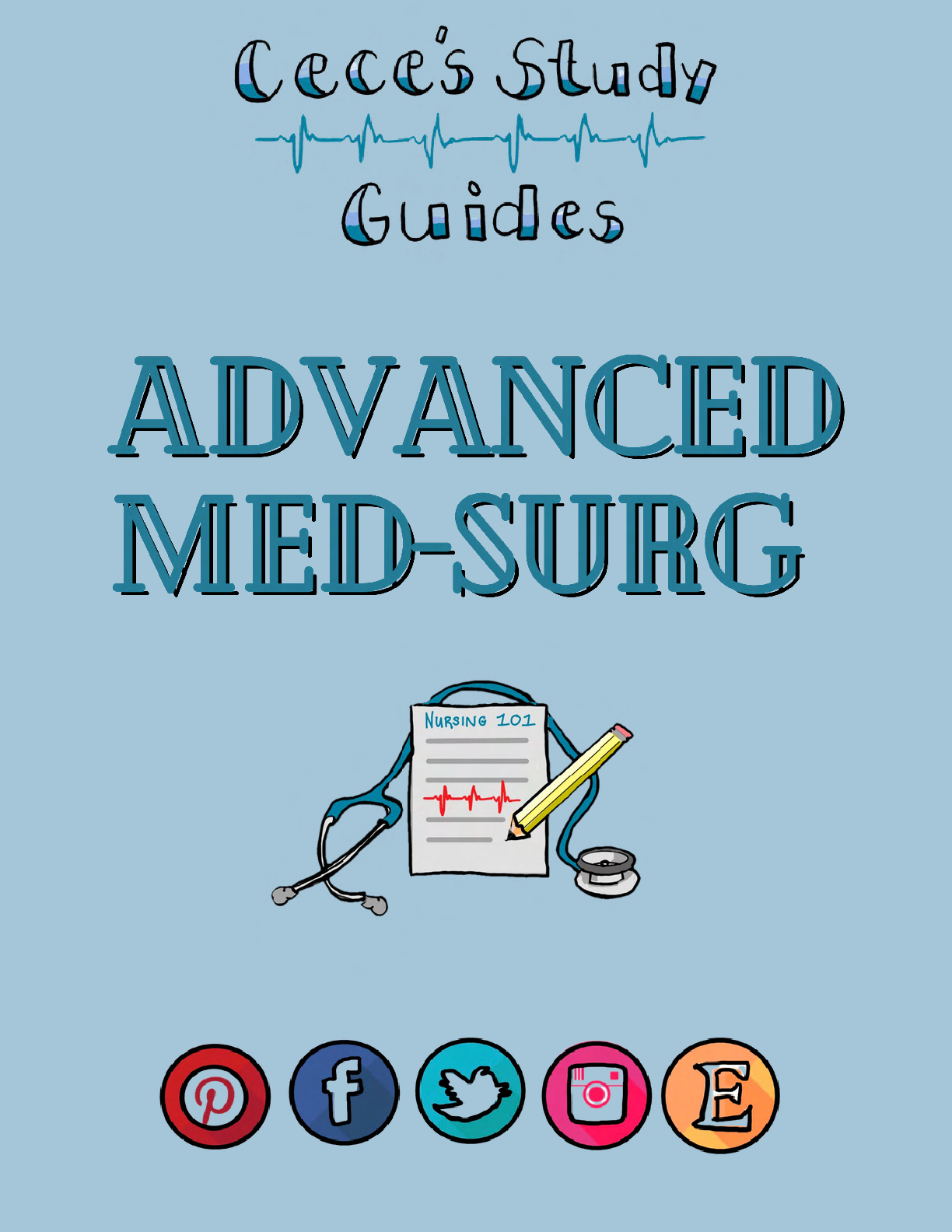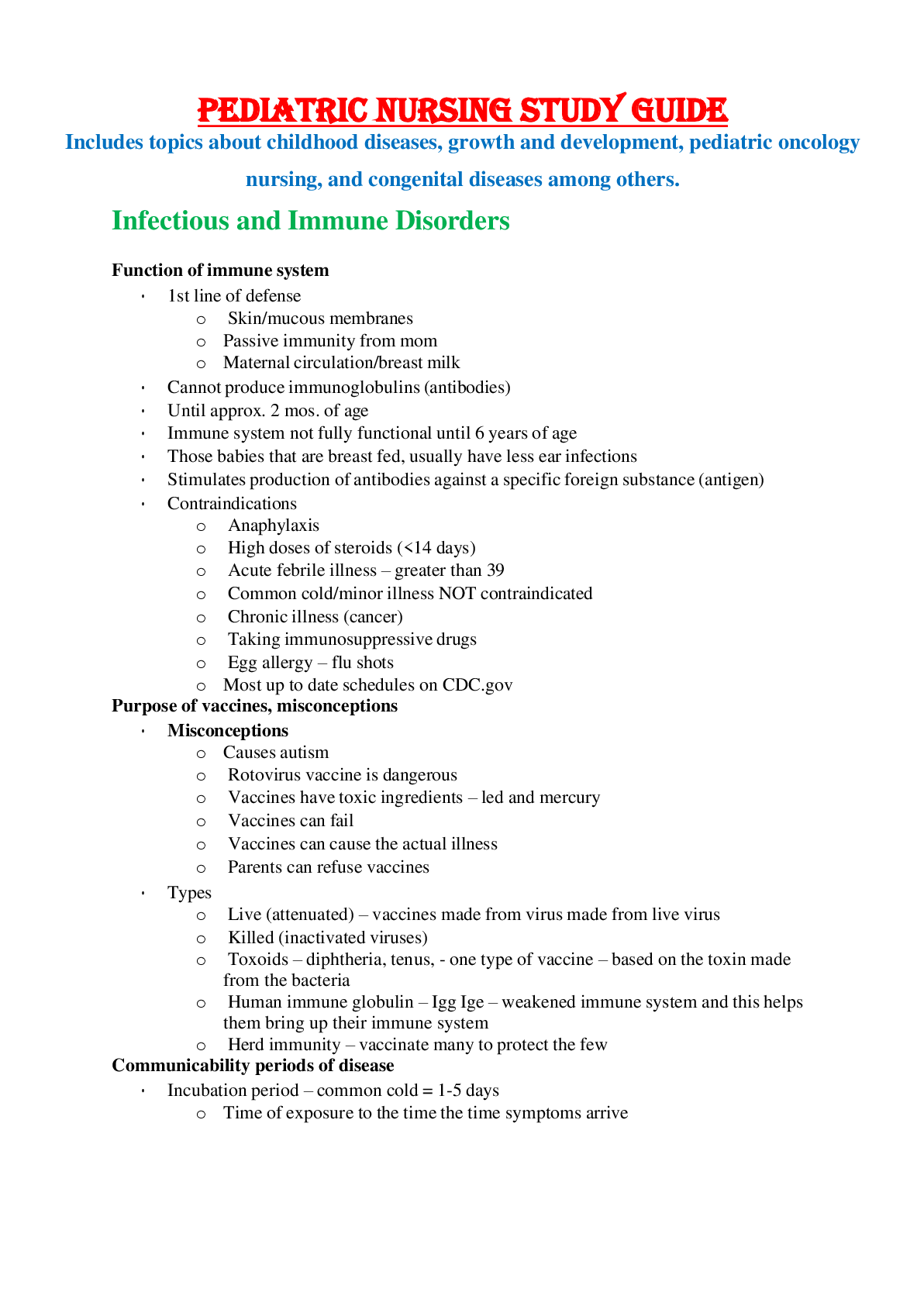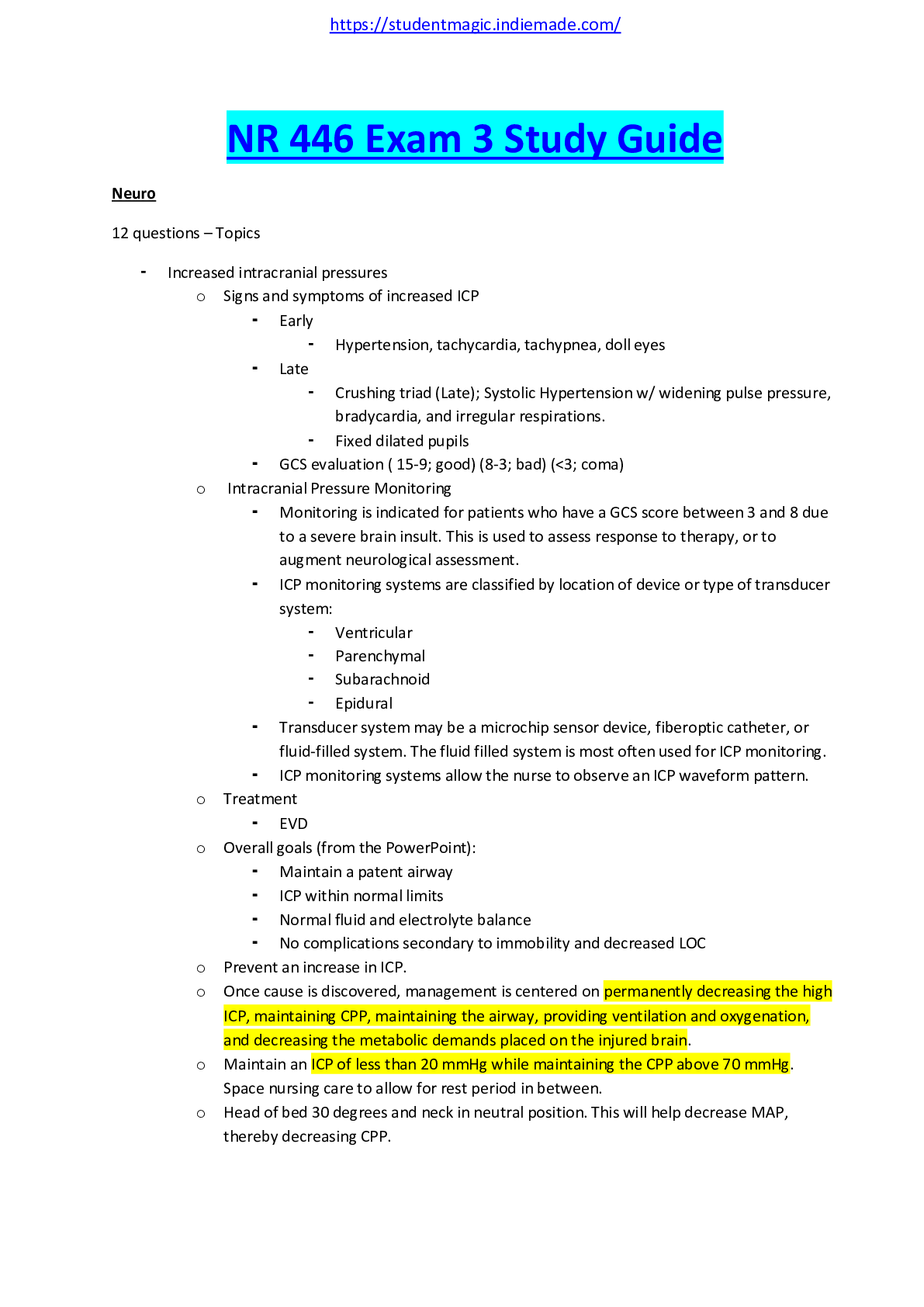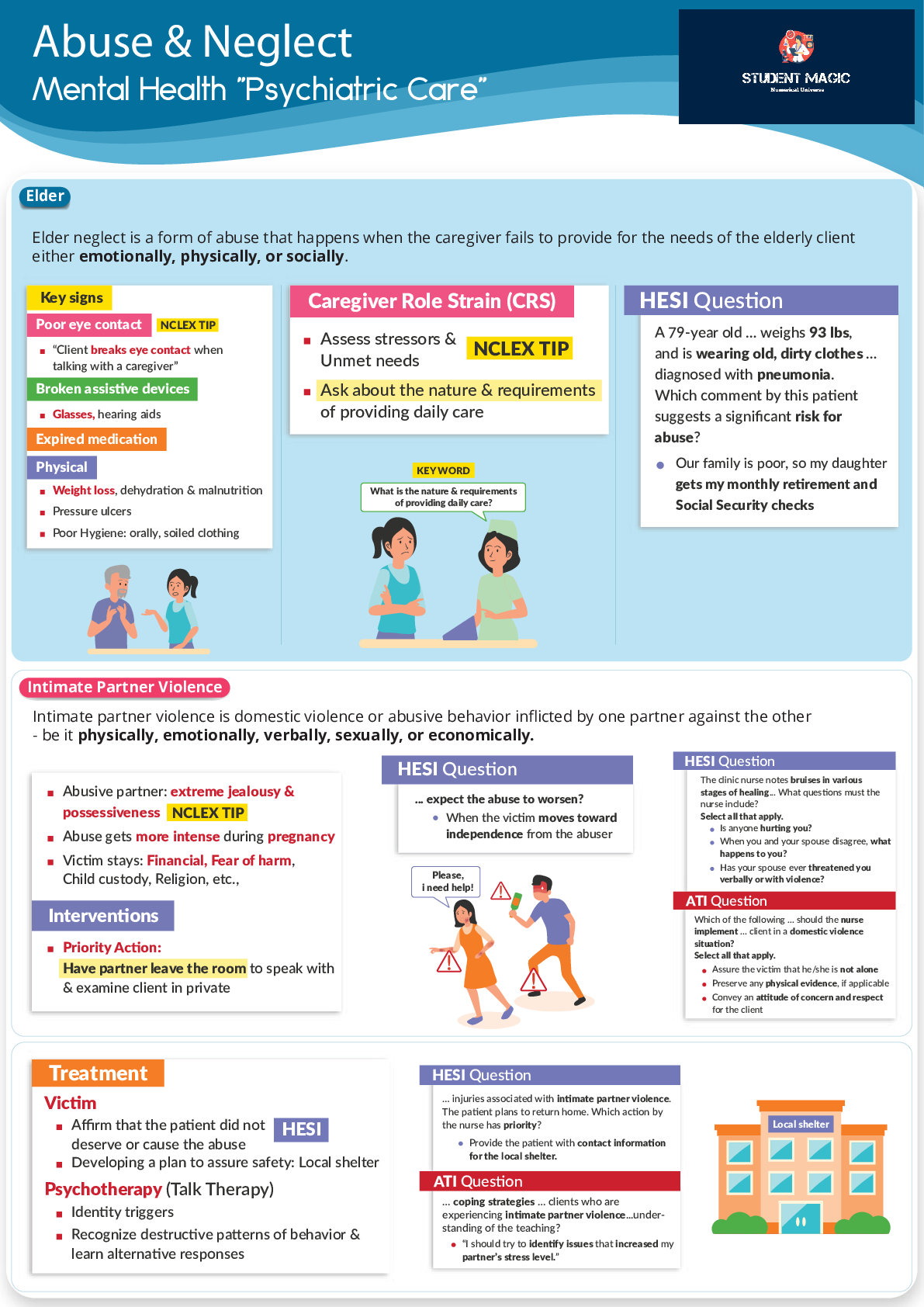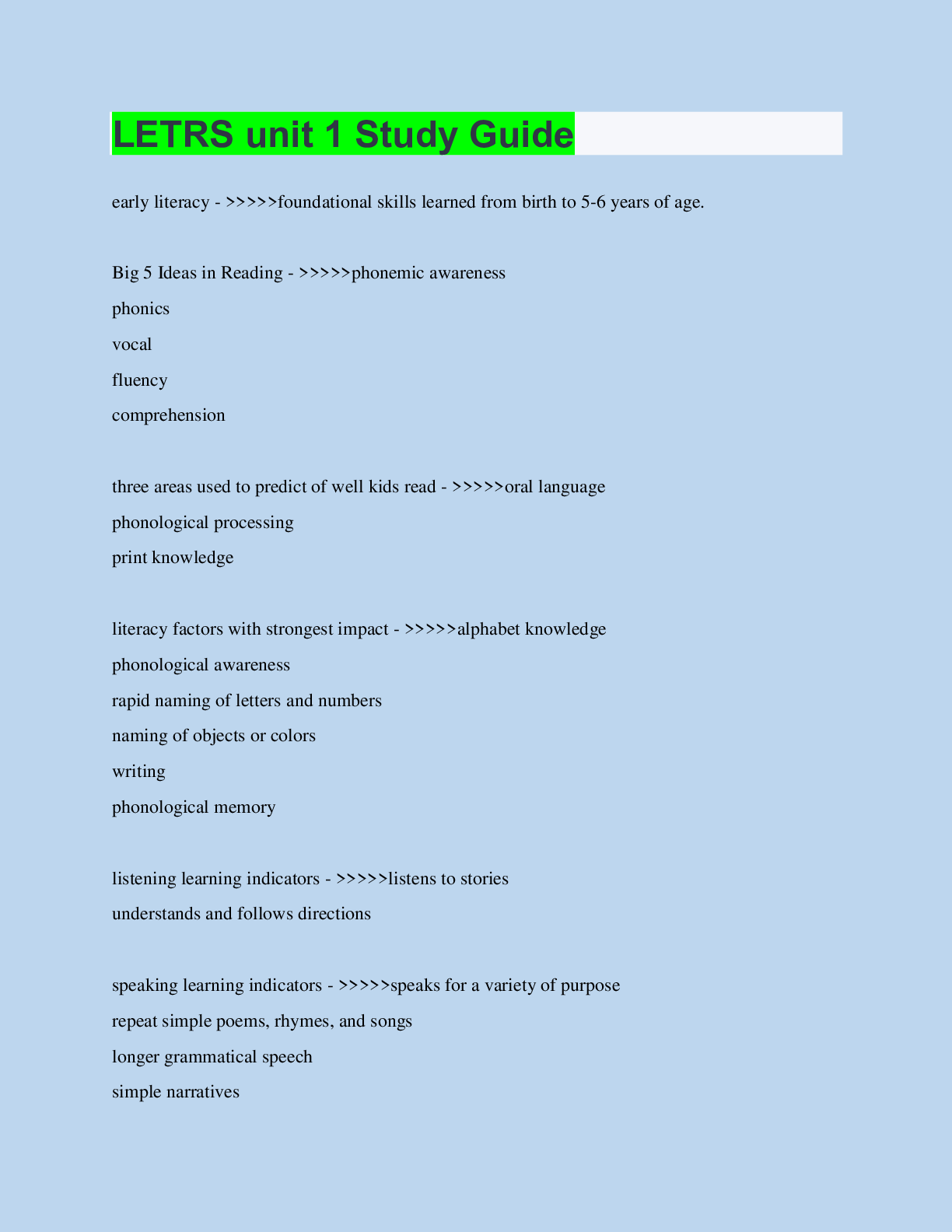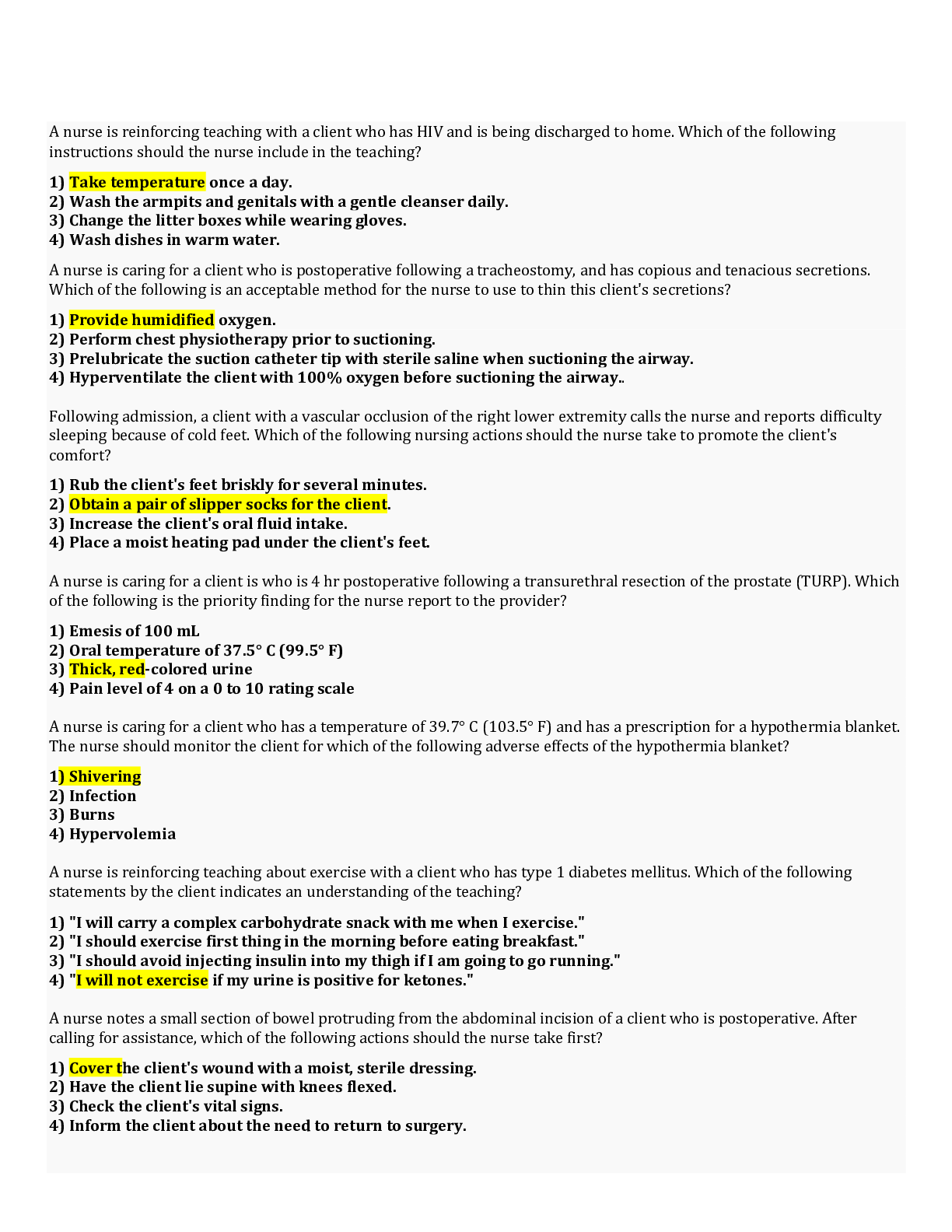English > STUDY GUIDE > ATI TEAS English and Language Usage Test, Complete Latest guide. (All)
ATI TEAS English and Language Usage Test, Complete Latest guide.
Document Content and Description Below
TEAS 6 ENGLISH/ LANGUAGE STUDY GUIDE ENGLISH & LANGUAGE Section: V-Verb S-Subject HV-Helping Verb MV-Main Verb VP-Verb Phrase SV-Singular Verb PV-Plural Verb LV- Linking Verb CLAUSE- A gro... up of related words that do have a Subject & a Verb EXAMPLE of Clauses: The ball flew over the fence. S V Wanda ran home and played in the yard. S V Although I jumped over the hurdles……. S V PHRASE- Lack a subject & predicate (verb) VERB PHRASES- A group of words working together to create the verb. Consist of a helping verb(s) and a main verb. [Helping Verb(s) + Main Verb]= Verb Phrase ***helping verb “helps” the main verb to complete a verb phrase*** Common helping verbs “To be” “to do” “to have” modals Am, are, is do have could, would, should Was, were does has may, might, must Be, been did had can, will, shall VP EXAMPLE: Dana [was sleeping] on the couch. HV MV VP Dana [might have been sleeping] on the couch. HV HV HV MV A VERB PHRASE CAN BE INTERRUPTED BY AN ADVERB. EXAMPLE: Arnav was preparing for his test. Arnav was not preparing for his test. Arnav was eagerly preparing for his test. Arnav was not eagerly preparing for his test. ADVERB- Modifies a verb, adjective, another adverb, determiner, noun phrase, clause, or sentence. LINKING VERBS-Linking verbs connect the subject of the verb to additional information about the subject (or state of being). A linking verb is a verb that links (connects) the subject of the sentence to information about that subject. Linking verbs include the verbs: be, become, and seem. Examples: He is a minister. She seems very nice. The night became darker. EXAMPLE: Jermaine was washing his car. S LV V Fahim may have arrived this morning. S LV LV V Rachel could have been practicing in the backyard. S LV LV LV V Present Tense Past Tense I am we are I was we were You are you (y’all) are you (y’all) were you (y’all) were He is, she is, it is they are he was, she was, it was were VERB- Action in a sentence or state-of-being. COMPOUND PREDICATES/ VERBS- 2 or more Predicates (verbs) in a sentence EXAMPLE: Tyler read and studied. Tyler read, studied and slept. -A Note on Three Problem Verbs- Three common irregular verbs that confuse many writers are be, do, and have. Here are the correct present tense and past tense forms of these three verbs. Be Present Tense I am we are Past Tense I was we were You are you are He, she, it is they are you were he, she, it was you were they were Do I do we do You do you do He, she, it does they do I did you did you did he, she, it did we did they did Have I have we have I had we had You have you have you had you had He, she, it has they have he, she, it had they had SIMPLE & COMPLETE SUBJECTS & PREDICATES/ VERBS: SIMPLE SUBJECT SIMPLE PREDICATE/ VERB Dog Barked COMPLETE SUBJECT COMPLETE PREDICATE/ VERB A cute little dog with a purple collar barked very loudly at the mailman. SUBJECT- Noun in a sentence that is doing the action. COMPOUND SUBJECT- 2 or more Subjects in a sentence. EXAMPLE: Billy and Kim ate pizza. Billy, Kim, and Sam ate pizza. COMPOUND SUBJECTS USING “OR” When “or” combines 2 subjects, use the subject closest to the verb to determine whether the verb is singular or plural. EXAMPLE: The waiters or the manager serves dinner to the guests. PV The managers or the waiters serve dinner to the guests. SV Your teacher or your parents are making sure you study. PV Your parents or your teacher is making sure you study. SV What three ingredients does a complete sentence need? A) Subject B) Verb C) Complete thought Define a “Fragment”: An incomplete sentence; A group of words that does not express a complete thought. EXAMPLE: on the baseball field could have slept later the boy in the baggy pants after we left the pool What are the two ways to fix a fragment? A) Add missing ingredients, such as: subject, verb, complete thought B) Attach or connect it to the sentence before or after Define a “Run-On”: A sentence that has 2 or more sentences smashed together without anything between them EXAMPLE: I was hungry I ate lunch. (run-on) I was hungry; I ate lunch. (correction #1) I was hungry, so I ate lunch. (correction #2) I was hungry. I ate lunch. (correction #3) Define a “Comma-Splice”: Like a run-on, 2 or more sentences that only has a comma in between them, which is not enough EXAMPLE: I was tired, I went to bed. (comma-splice) I was tired, so I went to bed. (correcting comma-splice = complete sentence) What are the four ways to fix a run-on or comma-splice? A) Period + Capitalization B) Semi-colon C) Comma + FANBOYS D) Dependent word COORELATIVE CONJUNCTIONS- Pairs of conjunctions that join or relate similar words. Either….Or Not only….But also Neither…..Nor Both…..And EXAMPLE: You may either eat this ice cream or drink this milk shake. Neither Jason nor Julio are ready to leave. Tonya ate not only her peas but also her carrots. We will need both fruit and vegetables for our smoothie. List all seven of the “FANBOYS” words: Coordinating Conjunctions (connects 2 independent clauses). For And Nor But Or Yet So EXAMPLE: Griffin or Sam will be the leader. Zach played, sand, and swam after school. We arrived late, so we skipped dinner. They were not hungry, for they had already eaten. (Comma + FANBOYS) Subordinating Conjunctions- Joins a dependent clause to a main (independent) clause. If an AAAWWUUBBISS is the first word in a sentence, it causes a comma. After Although As When While Until Unless Before Because If Since So More words: As though, So that, Than, Whenever, As if, Even though, Though, As soon as. ***Subordinating Conjunctions come at the beginning of “Subordinate (dependent) clause” *** Dependent clause: subject, verb, does not complete a thought, cannot stand on its own (not a sentence). EXAMPLE: Even though I cried, I felt better. After I left the movies, I went home. ***Begins with a subordinating conjunction*** Dependent words: Because After Unless While If Although Until As if When As What Which Where Even though Whenever Since Who Even when Wherever That Fancy Transition Words (transitional expression): Therefore Then Thus In addition In fact Indeed However Likewise Moreover Furthermore https://msu.edu/~jdowell/135/transw.html PRONOUNS & ANTECEDENTS PRONOUN- A word that takes place of a noun. ANTECEDENT- The noun that the pronoun is replacing. [I, you, he, she, it, we, they, him, her, us, them]. EXAMPLE: Becky Sue was tired, so after school she rode her bike home to take a nap. Hopefully you enjoyed our lesson on pronouns that we prepared for you! Antecedent= Becky Sue TWO CATEGORIES OF NOUNS=COMMON NOUN & PROPER NOUN COMMON NOUN- Any one of a person, place or thing PROPER NOUN- Refers to a specific person, place or thing. (Requires Capitalization) https://www.umaryland.edu/media/umb/oaa/campus-life/writing-center/documents/Capitalization.pdf https://www.grammarbook.com/punctuation/capital.asp https://owl.english.purdue.edu/owl/resource/592/1/ CAPITALIZATION BASIC RULES -Capitalize proper nouns of people & specific places (streets, cities, states, mountains...etc). -Capitalize first word of every sentence. -Capitalize specific holidays, months, days (DO NOT CAPITALIZE SEASONS). -Capitalize religions, religion holidays & texts. CAPITALIZATION ADVANCE RULES -Capitalize a person’s title, when it take the place of the person name, or if it is used in direct address. -Capitalize words used to name regions, but DO NOT CAPITALIZE DIRECTIONS (points on a compass). -Capitalize brand names or organizations used as nouns or objectives. -Capitalize major words in titles (no prepositions, articles) ***remember to apply these rules in your writing*** ADJECTIVE- A describing word COMMON ADJECTIVE- Words that describes nouns and pronouns. Adjectives answer four questions: What kind? Which one? How many? How much? EXAMPLE (how many?): I ate four slices of pizza. Multiple businesses closed for the holiday. How many? What kind?: Several pandas rolled in the green grass. What kind?: I ate a delicious apple. She purchased a rare book. Which one?: The little boy smiled. I chose that flavor of ice cream. The winning ticket was underneath the chair. How much?: There were few candidates left in the debate. We had sufficient time to complete the tasks. PREPOSITION- Links a noun or pronoun to other words in a sentence. Prepositional phrases= hows the relationship between person, place or thing. Preposition, is basically like a bunch of words that begins with a preposition and ends with a noun or pronoun. EXAMPLE: The cookies are in the cupboard. The plane flew through the white and puffy cloud. The cat was hiding under the chair. The puppy was resting on top of the worn tattered bed. Janice set her jump rope on the old blue desk. She read the book during class. COMPOUND PREPOSITION: From, to, of (at the end of a word) EXAMPLE: due to, In addition to, aside from, out of, on top of, across from, according to PREPOSITION WORDS: (memorize) About, above, across, after, against, along, among, as, at, around, before, behind, beneath, by, beside, between, into, like, near, of, off, for, inside, into, out, outside, on, onto, over, with, within, in, through, to, under, underneath, until, from, regarding, opposite, except, up, but POSSESSIVE WITH A GERUND Incorrect: I appreciate you helping me. Correct: I appreciate your helping me. (it’s the help that belongs to you!) Incorrect: Me crying made her sad. Correct: My crying made her sad. Incorrect: That baby laughing is infectious. Correct: That baby’s laughing is infectious. HYPHENS-Used to establish clarity with prefixes NUMBERS= Twenty-five books COMPOUND NOUNS= Great-grandfather, Great-niece, COMPOUND ADJECTIVES= Once-a-day vitamin EXAMPLE: I’d like to re-press those shirts Please re-sign that form. APOSTROPHES: BASIC RULES Two Ways To Use Apostrophes 1. To contract words (ie, contractions) 2. To show possession (ie, possessives) Contractions Do not put your feet there. Don’t put your feet there. We can not go to the beach. We can’t go to the beach. I should have said something. I should’ve said something. Possession To form the possessive of any singular noun, use an apostrophe and an “s” (‘s): The dog’s house… The woman’s shoes… Charles’s shirt… The boss’s office… To form the possessive of any plural noun NOT ending in “s” use an apostrophe and an “s” (‘s): The children’s playroom… The women’s dressing room… The geese’s feathers… To form the possessive of any plural noun ending in “s” use an apostrophe and an “s” (s’): The bosses’ offices… The churches’ parishioners… The schools’ principals… Apostrophes with individual and joint possession. ----We know apostrophes indicate possession, but what happens when you have a compound subject showing possession? Who owns what? Individual Possession- (both take apostrophes) Luke’s and Jamilia’s toys are scattered on the floor. Your mom’s and your dad’s shoes are on the closet floor. Joint Possession- (one apostrophe on last subject) Luke and Jamilia’s toys are scattered on the floor. Your mom and dad’s love for you is everlasting. MODIFIER- a word, phrase, clause that changes the meaning of something MISPLACED MODIFIER- a modifier appearing incorrectly in the sentence. Put the Modifier(s) next to the word(s) they’re describing. That way people won’t get confused being described. EXAMPLE: We ate a cold plate of shrimp for dinner. We ate a plate of cold shrimp for dinner. They quickly ate the dinner they had prepared. They ate the dinner they had quickly prepared. He threw the ball to the girl made of orang rubber. He threw the ball made of orange rubber to the girl. They watched the sunset sitting on the porch. Sitting on the porch, they watched the sunset. What is voice (in a grammatical sense)? Voice refers to the form a verb which indicates whether its subject is performing the action or whether subject is being acted upon. Two kinds of voice Active Voice Passive Voice (Subject performs action) (Subject is acted upon) EX: Makayla returned the book. The book was returned by Makayla. Felix grew cucumbers. Cucumbers were grown by Felix. Jill’s parents ate the cakes. The cakes were eaten by Jill’s parents. Hopefully, you have learned something new in this lesson! (active voice) Hopefully, something new has been learned by you! (passive voice) HOMONYMS are words that sound alike but have different meanings. Homophones are a type of homonym that also sound alike and have different meanings, but have different spellings. HOMOGRAPHS are words that are spelled the same but have different meanings. HOMOPHONES- Set of words that are pronounced similarly but have different meanings. . Homophones bare/bear, brake/break, die/dye, effect/affect, flour/flower, heal/heel, insure/ensure, morning/mourning, peace/piece, poor/pour, principal/principle, sole/soul,stair/stare, suite/sweet, their/there/they’re, wear/where HOMOGRAPH is a word that has the same spelling as another word but has a different sound and a different meaning: lead (to go in front of)/ lead (a metal) wind (to follow a course that is not straight)/ wind (a gust of air) bass (low, deep sound)/ bass (a type of fish) HOMONYM is a word that is said or spelled the same way as another word but has a different meaning. "Write” and “right” is a good example of a pair of homonyms. Homonym traces back to the Greek words homos, meaning “same,” and onuma, meaning “name.” So a homonym is sort of like two people who have the same name: called the same thing but different. A homonym can be a word that sounds the same as something else — like by (“near”) and buy (“purchase”) — or it can be spelled exactly the same way and pronounced differently — like minute(unit of time) and minute (“tiny”). buy - to purchase by - (1) close to; (2) no later than; (3) through the action of ex: Buy furniture from Sofas Inc. by the end of the year, and you won’t have to pay until March. past - (1) the time before the present; (2) by passed - (the past tense of pass) (1) handed to; (2) went by; (3) completed successfully ex: In the past, I have passed all my courses, but I may not pass them all this semester. principle - a guideline or rule principal - (1) main; (2) the person in charge of a school ex: Our principal believes in the principle of giving teachers a great deal of freedom. a - used before words that begin with a consonant sound an - used before words that begin with a vowel or a silent h (as in an hour) ex: Would you like an ice cream cone or a shake. accept - (1) to receive; (2) to agree to take; (3) to believe in except - (1) excluding or leaving out; (2) but ex: All the employees except the part-timers were willing to accept the new contract. advice - opinion meant to be helpful advise - to give an opinion meant to be helpful ex: Never take the advice of someone who advises you to act against your conscience. affect - to influence; have an effect upon effect - a result or impact of something; an outward appearance ex: Divorce affects an entire family, and its effects-both good and bad-last for years. desert - (1) a verb, “to leave or abandon”; (2) a noun, “a dry region with little or no plant growth” dessert - a sweet course eaten at the end of a meal ex: The children were willing to desert the TV set only when dessert was served. fewer - used for items that can be counted less - used for general amounts ex: As our congregation ages, our church is left with fewer members and less financial support. loose - (1) not tight; (2) free; not confined lose - (1) to misplace; (2) to not win; (3) to be deprived of something one has had ex: If you don’t fix that loose steering wheel, you could lose control of your car. quiet - (1) silent; (2) relaxing and peaceful quite - (1) truly; (2) very; (3) completely quit - (1) to stop doing something; (2) to resign from one’s job ex: Giselle was quiet after saying she might want to quit her job but that she wasn’t quite sure. than - a word used in comparisons then - (1) at that time; (2) next ex: First Dad proved he was a better wrestles than I am; then he helped me improve. use - to make use of used (to) - accustomed to or in the habit of ex: I am used to very spicy food, but when I cook for others, I use much less hot pepper. were - the past tense of are we’re - contraction of we are ex: We’re going to visit the town in Florida where my grandparents were born. WHO vs. WHOM Who- used as a subject Whom- used as an object (Nominative case) (Objective case) Substitute “he” for who Substitute “him” for whom Who = he Whom = him Who called Leslie? Leslie called whom? (“He” called Leslie?) (Leslie called “him?”) FREQUENTLY MISSPELLED WORDS: Accommodate, Receive, Argument, Recommend, Commitment, Consensus, Deductible, Dependent, Embarrass, Existence, Foreword, Harass, Inadvertent, Indispensable, Liaison, License, Occasion, Occurrence, Perseverance, Prerogative, Privilege, Proceed, Separate, Supersede, Withhold, Acknowledgement, Judgement. http://www.esldesk.com/vocabulary/misspelled-words http://www.theenglishstudent.com/blog/category/grammar “i” before “e” - piece cashier believe tried friend “e” before “i” - deceive receive ceiling leister neither sound like “A” - neighbor eight vein weight feign COLONs- are introductory devices. They introduce a list of items or to signal something important, such as, WARNING: MEDICINE MAY CAUSE DROWSINESS. COLON RULES- Use a colon after an independent clause. Do not use a colon immediately after a verb. Do not capitalize on the first letter after a colon (unless it’s a quote). Incorrect: We ate: pizza, candy, and ice cream. Correct: We ate the following items: pizza, candy, and ice cream. (list) Correct: Lincoln began with the following: “Four score and seven…” (quote) COLON tend to come after statements that require further explanation. EXAMPLE: Latoya had only one item left to do: turn in her essay. There was something shane feared the most: public speaking. The coach asked a final request of his players: win the game. Salutation of a Business Letter (COLON) Dear Sir or Madam: It has come to our attention that… To whom it May Concern: We have received numerous complaints… Answer the following: compound, simple, complex, and compound-complex sentences. 1. Darcy stayed home from school on Friday. A: Simple B: Compound C: Complex D: Compound-Complex 2. Lisa got sent to the principal's office because she was late. A: Simple B: Compound C: Complex D: Compound-Complex 3. Go clean your room. A: Simple B: Compound C: Complex 4. Although it was raining and the roads were slippery, we decided to go for a bike ride. A: Simple B: Compound C: Complex D: Compound-Complex 5. Our class made $25 at the fund-raiser, and we're going to donate it to the food bank. A: Simple B: Compound C: Complex D: Compound-Complex 6. If you want to go to the mall, you'll have to clean your room A: Simple B: Compound C: Complex D: Compound-Complex 7. Don't wait! A: Simple B: Compound C: Complex D: Compound-Complex 8. I wanted to play the drums, but my teacher wants me to play the trombone because there are too many drummers already. A: Simple B: Compound C: Complex D: Compound-Complex 9. When I grow up, I want to be a fireman. A: Simple B: Compound C: Complex D: Compound-Complex 10. I want a new doll, but I haven't saved enough money yet. A: Simple B: Compound C: Complex D: Compound-Complex 11. When I graduate, I want to go to college, but first I want to travel. A: Simple B: Compound C: Complex D: Compound-Complex 12. Jamal wants to go to the movies, but he doesn't have enough money. A: Simple B: Compound C: Complex D: Compound-Complex 13. If I want to get a good grade, I'll have to study more. A: Simple B: Compound C: Complex D: Compound-Complex 14. When I graduate I want to go to college, but first I want to travel. A: Simple B: Compound C: Complex D: Compound-Complex 15. I want to do well in school because I want to go to college, but I have a lot of trouble with math. A: Simple B: Compound C: Complex D: Compound-Complex ANSWERS: A, C, A, D, B, C, A, D, C, B, D, B, C, B, D 1. Although he searched everywhere, Mr. Brooks could not find the keys to the computer lab. A. a simple sentence B. a compound sentence C. a complex sentence 2. The vacation to Myrtle Beach should be extremely restful. A. a simple sentence B. a compound sentence C. a complex sentence 3. While the music played, Rachel sneaked in through the side door. A. a simple sentence B. a compound sentence C. a complex sentence 4. Eric ran home the rest of the way because he knew he was in trouble. A. a simple sentence B. a compound sentence C. a complex sentence 5. Sarah and Ashley giggled and whispered all night. A. a simple sentence B. a compound sentence C. a complex sentence 6. Those clouds promise snow; we might get another snow day off from school. A. a simple sentence B. a compound sentence C. a complex sentence 7. Mara and Kelly had planned to return to Canada. A. a simple sentence B. a compound sentence C. a complex sentence 8. Dad went hunting, but Mama decided to stay home. A. a simple sentence B. a compound sentence C. a complex sentence 9. Her left arm was badly broken at the wrist during the car accident. A. a simple sentence B. a compound sentence C. a complex sentence 10. A simple sentence that stands alone is called . A. a dependent clause B. an independent clause C. a phrase 11. Dr. Matthews did what could be done, but it simply was not enough to save his life. A. a simple sentence B. a compound sentence C. a complex sentence 12. Mrs. Carrero said that will be enough, and everyone agreed. A. a simple sentence B. a compound sentence C. a complex sentence 13. My classmates were wearing heavy clothes in the winter months. A. a simple sentence B. a compound sentence C. a complex sentence 14. A sentence with one independent clause and at least one dependent clause is called . A. a simple sentence B. a compound sentence C. a complex sentence 15. What type of sentence has two independent clauses and is joined by a FANBOYS (conjunction) or a semicolon? A. a simple sentence B. a compound sentence C. a complex sentence 16. A subject and a verb that cannot stand alone is called a . A. simple sentence B. independent clause C. dependent clause D. complex sentence 17. I know you don't like him, but that doesn't matter. A. a simple sentence B. a compound sentence C. a complex sentence 18. Elijah remained at home because he had a sore throat. A. a simple sentence B. a compound sentence C. a complex sentence 19. Since we had only gone a mile from camp, we could turn back before dark. A. a simple sentence B. a compound sentence C. a complex sentence 20. In which of the following sentence types are FANBOYS or semicolons (;) used to join clauses? A simple sentences B compound sentences C complex sentences ANSWERS: C, A, C, C, A, B, A, B, A, B, B, B, A, C, B, C, B, C, C, B Teas 6 - Everything. All sets combined. Website below. Just copy & paste. file:///Users/admin/Documents/Teas%206%20-%20Everything.%20All%20sets%20combined.% 20Flashcards%20%7C%20Quizlet.webarchive GOOD LUCK! [Show More]
Last updated: 1 year ago
Preview 1 out of 21 pages
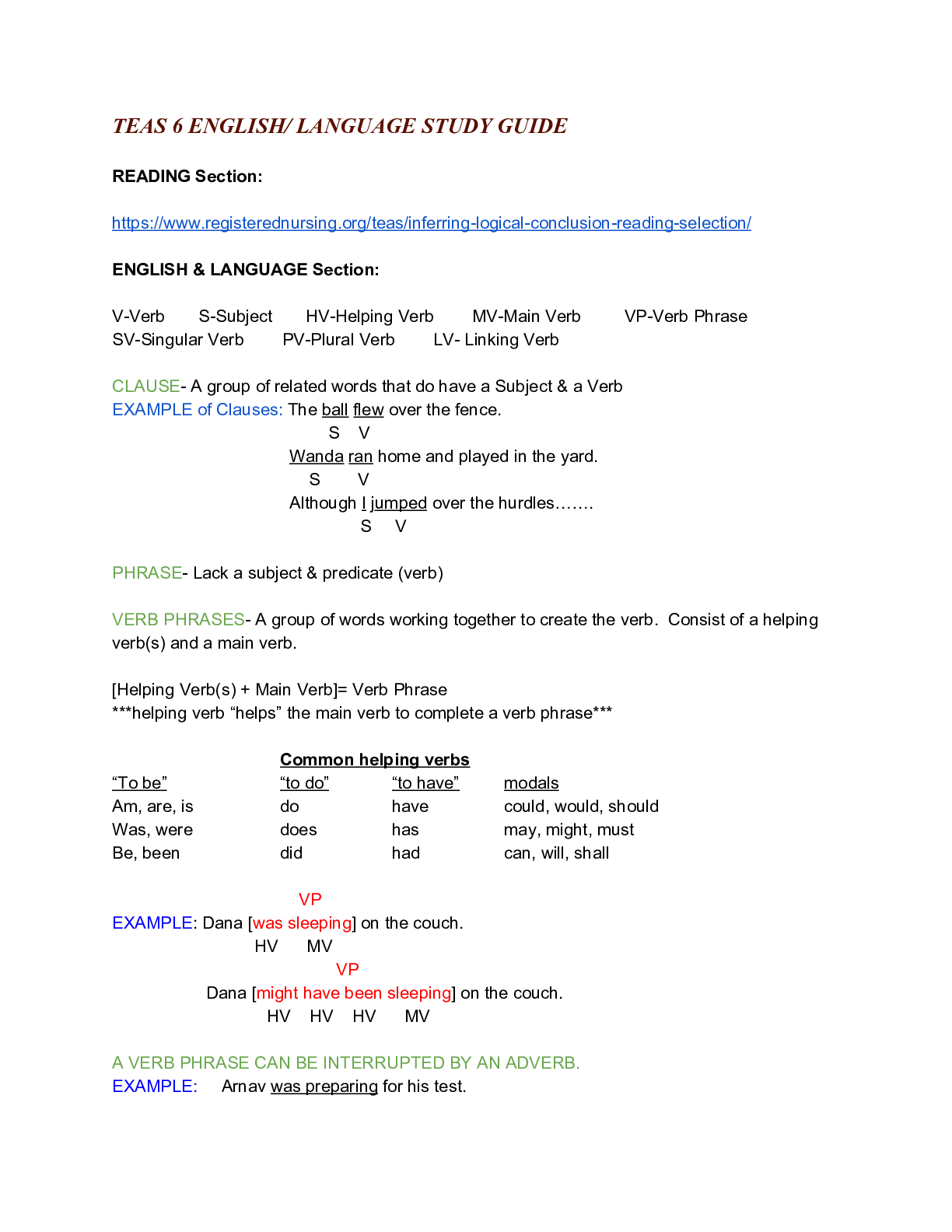
Also available in bundle (1)
.png)
ATI TEAS Science- Study Files (all) updated (BUNDLE)
ATI TEAS Science- Study Files (all) updated
By A+ Solutions 2 years ago
$14.5
10
Reviews( 0 )
Document information
Connected school, study & course
About the document
Uploaded On
Jul 12, 2021
Number of pages
21
Written in
Additional information
This document has been written for:
Uploaded
Jul 12, 2021
Downloads
0
Views
104

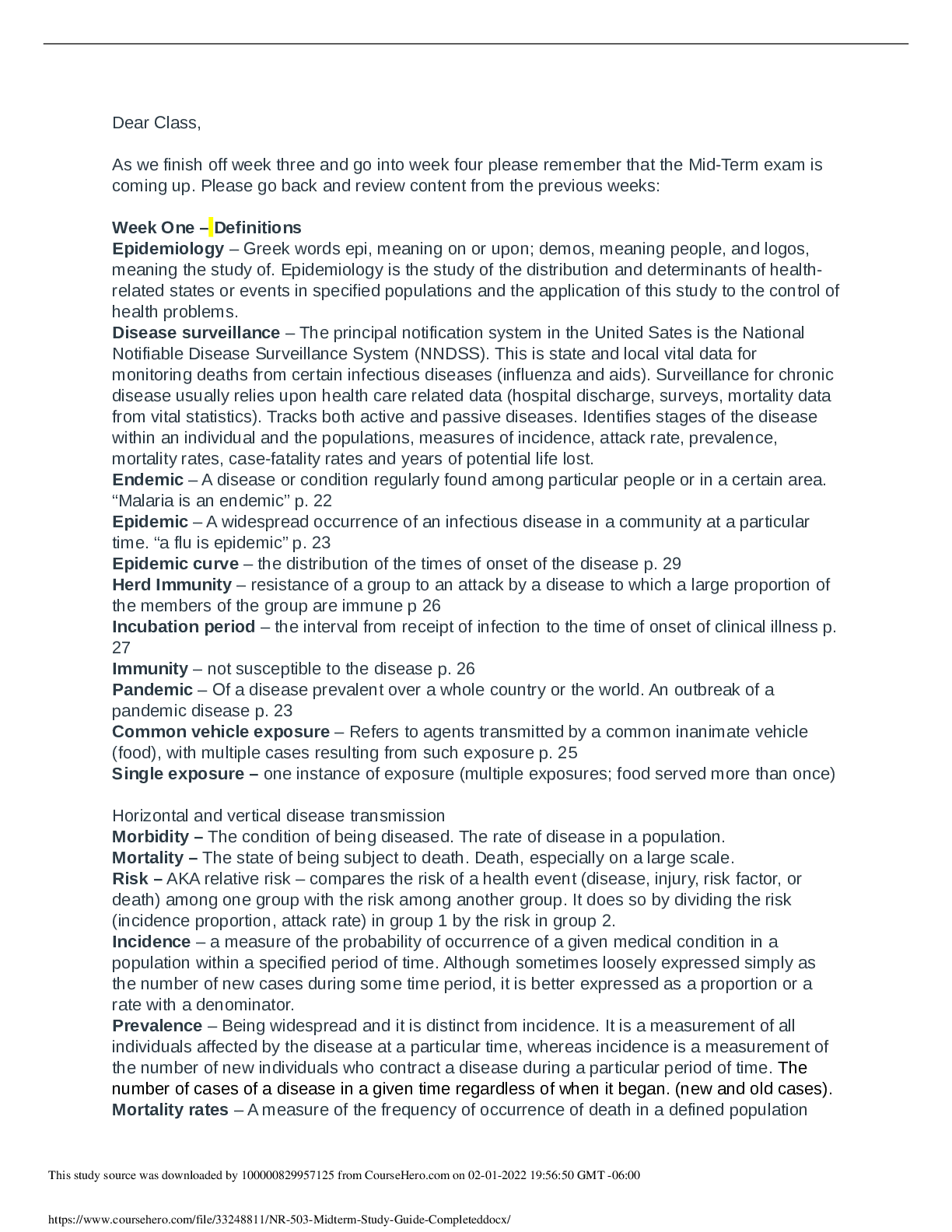
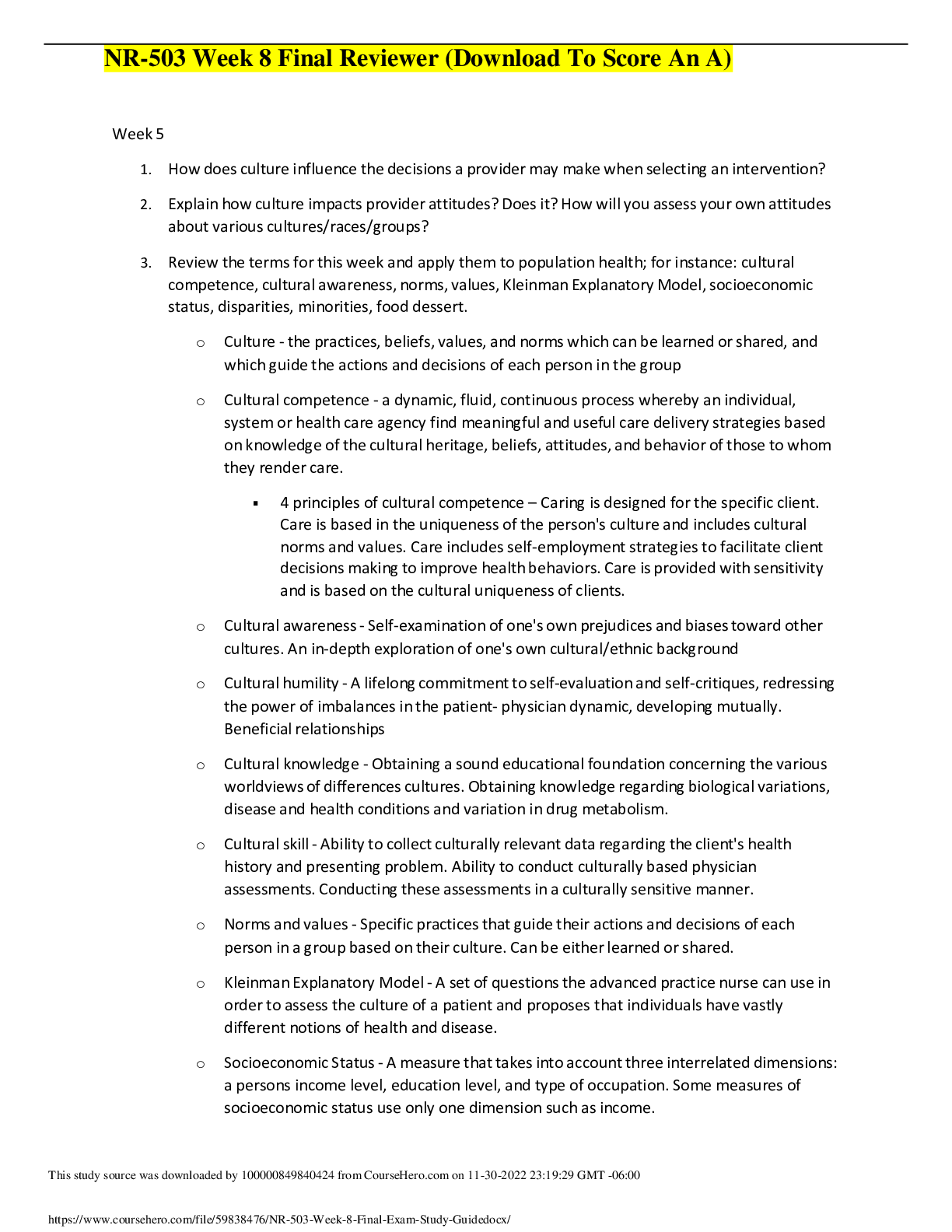
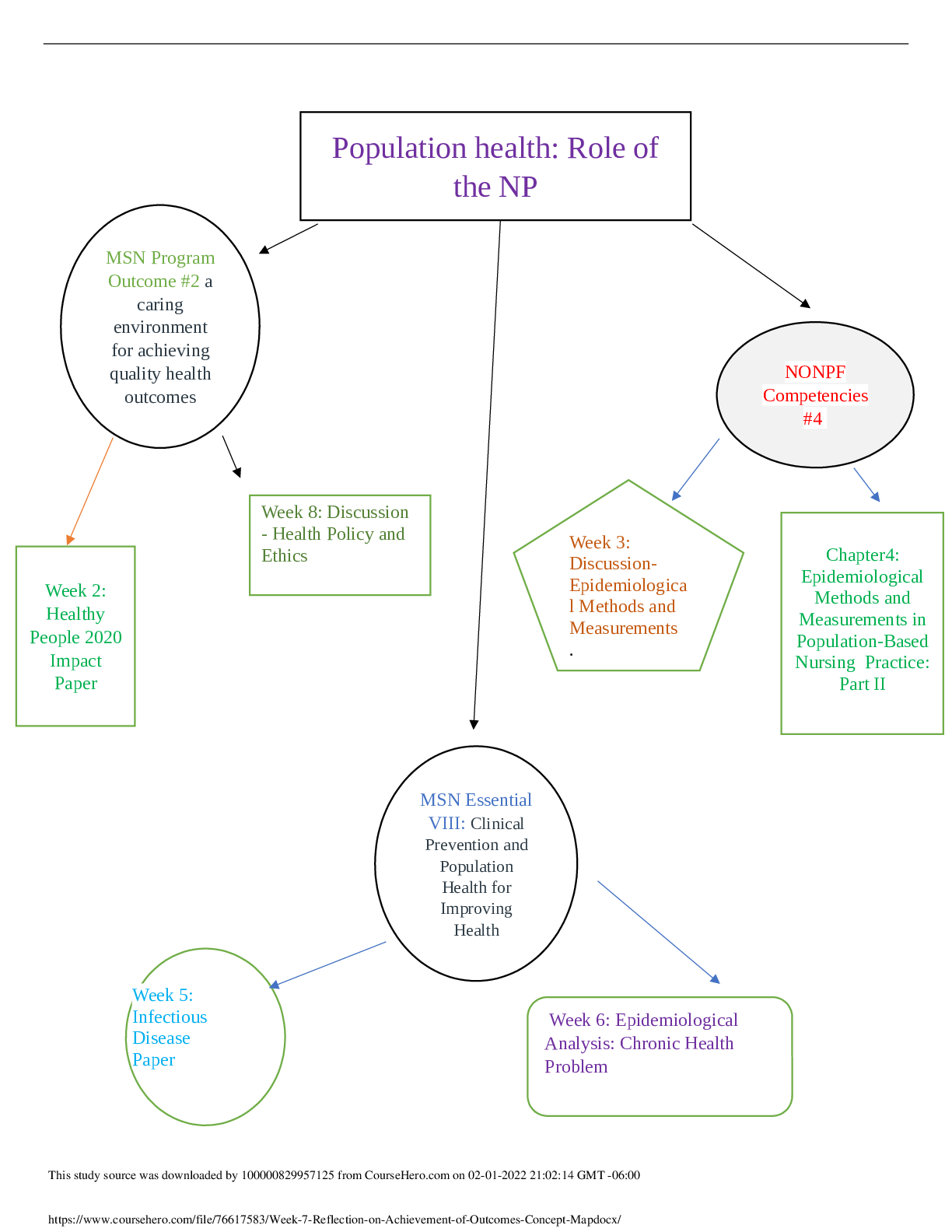
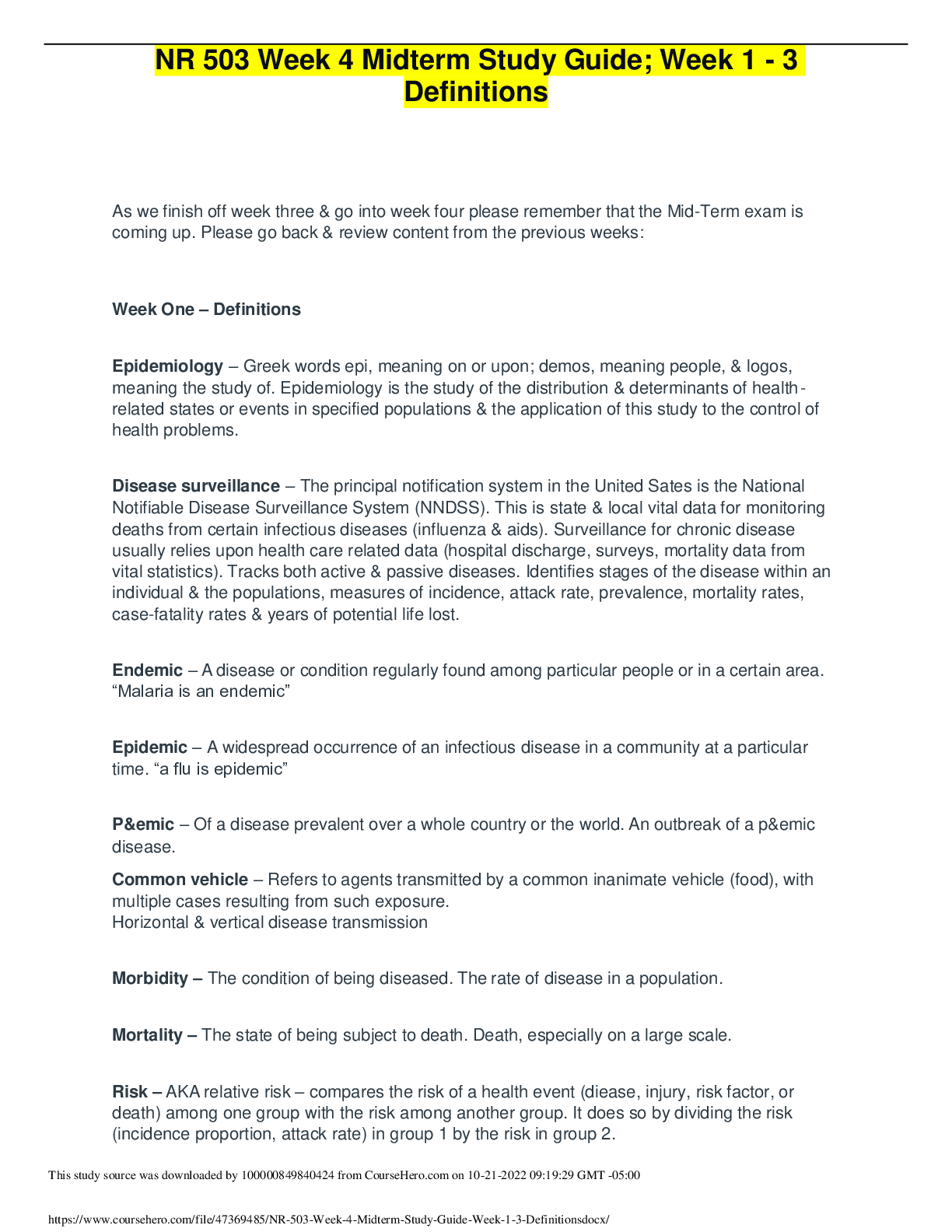
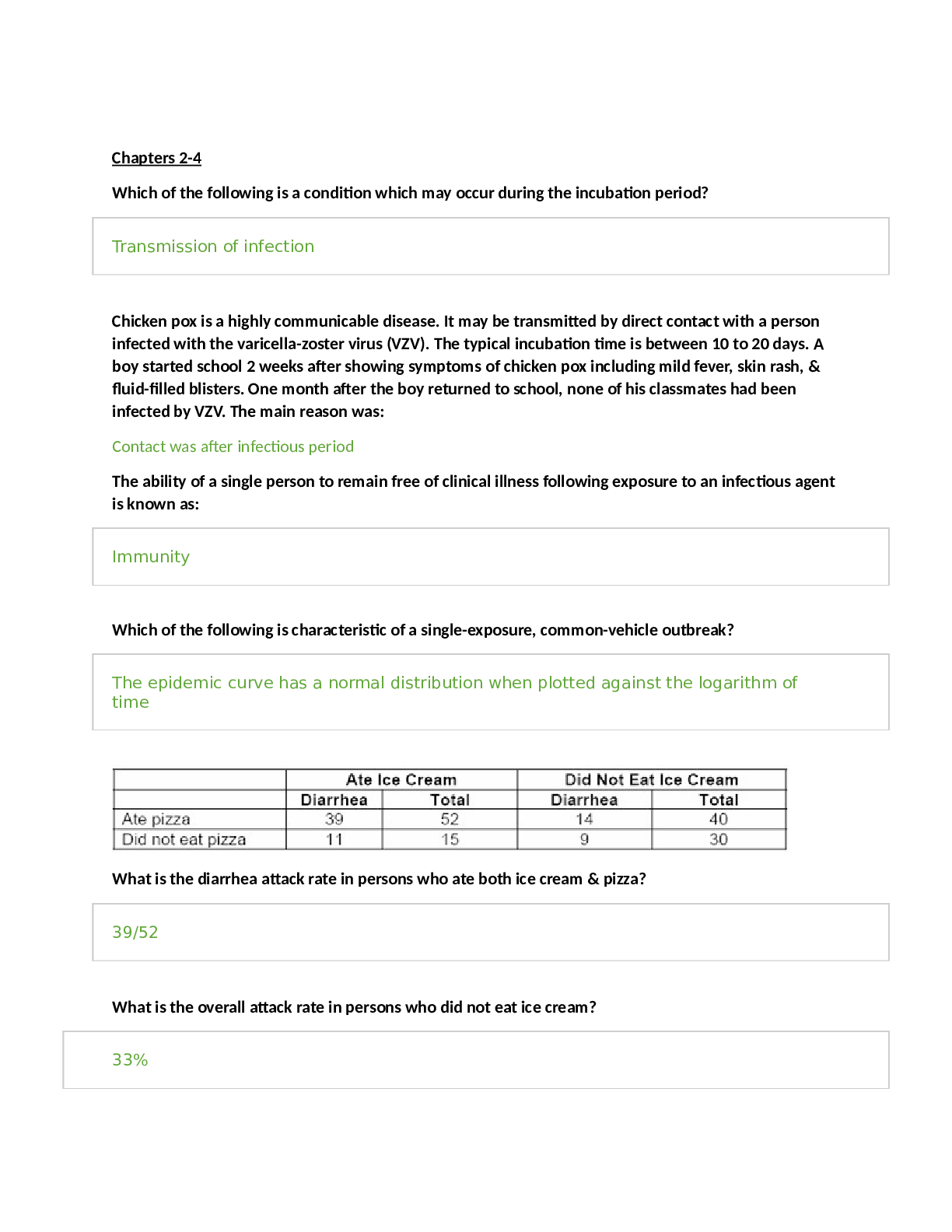
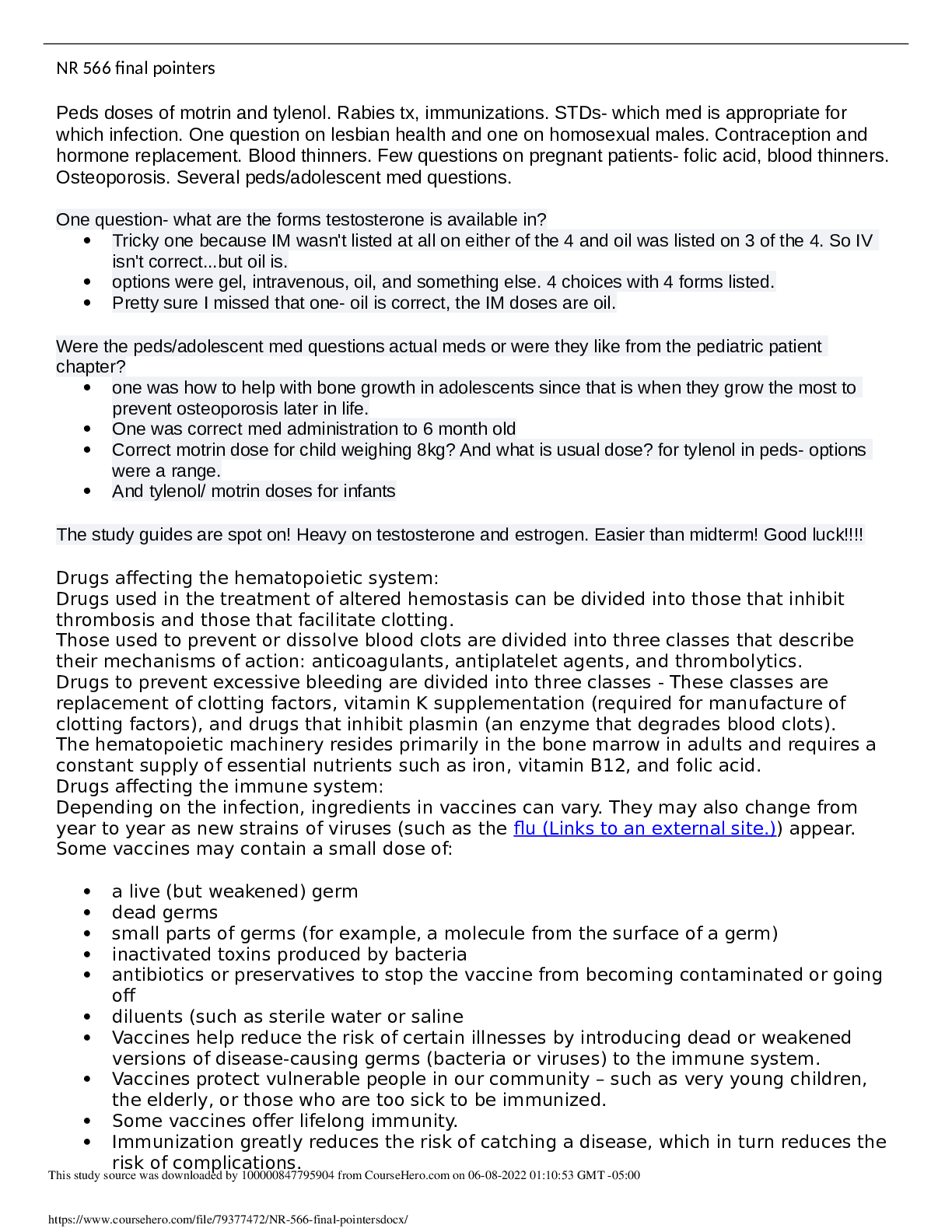
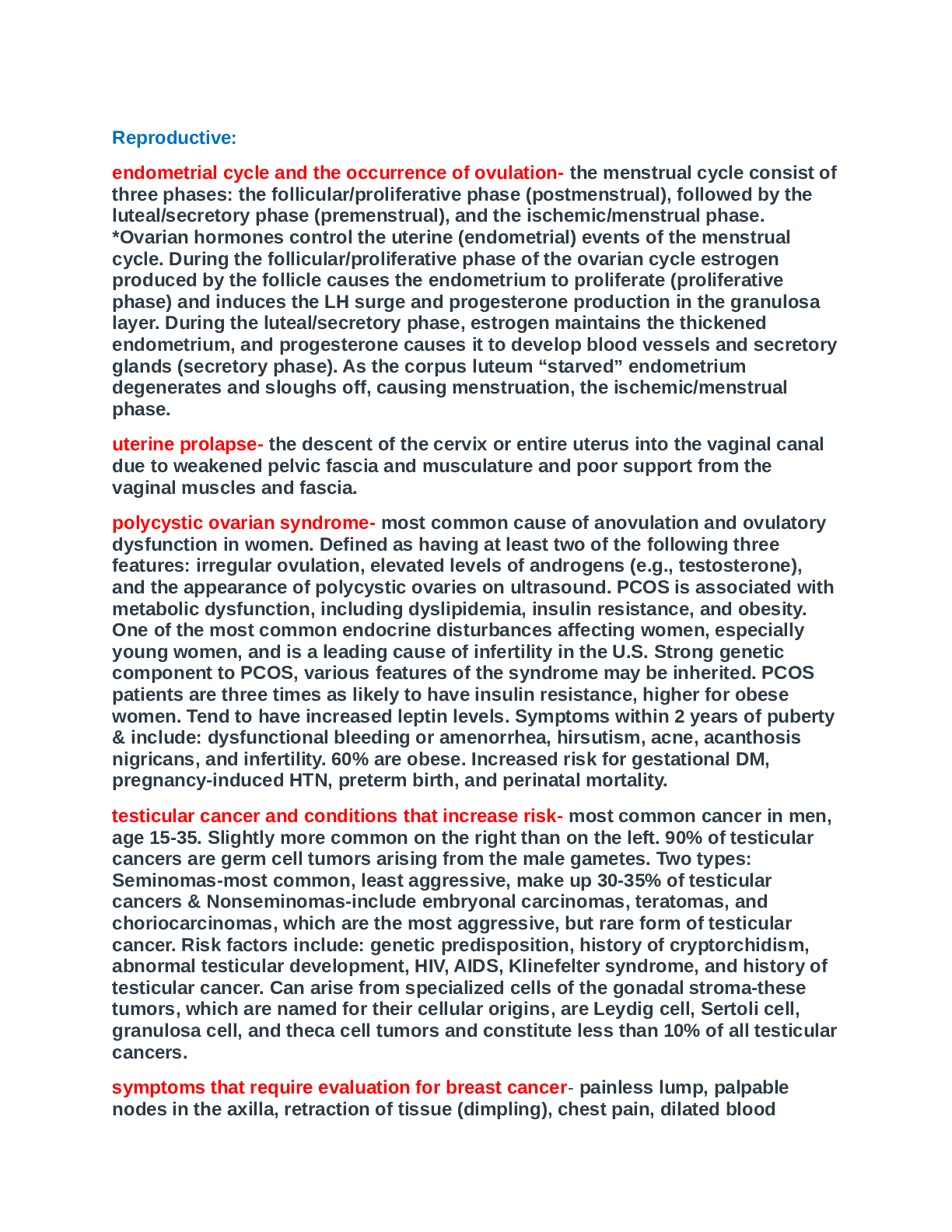
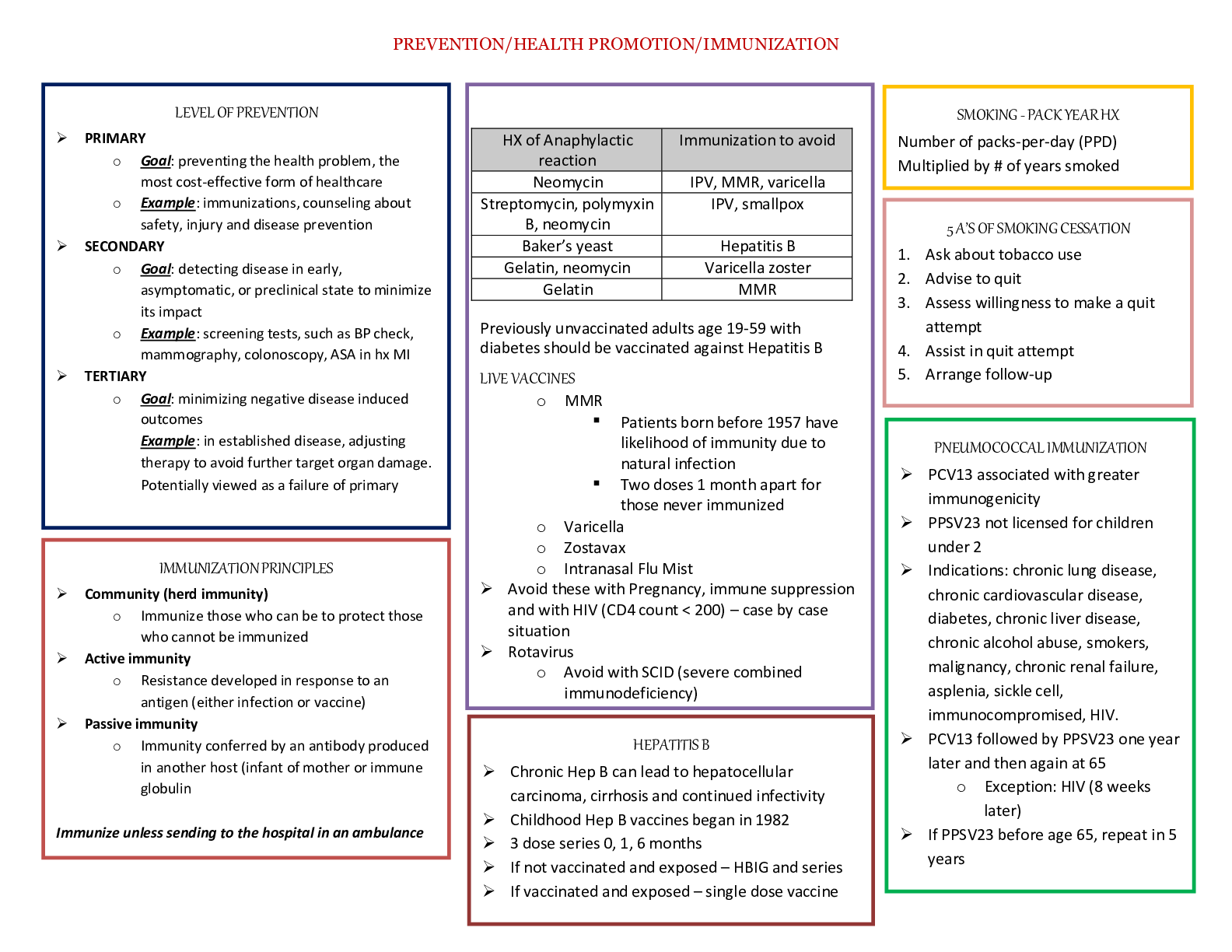
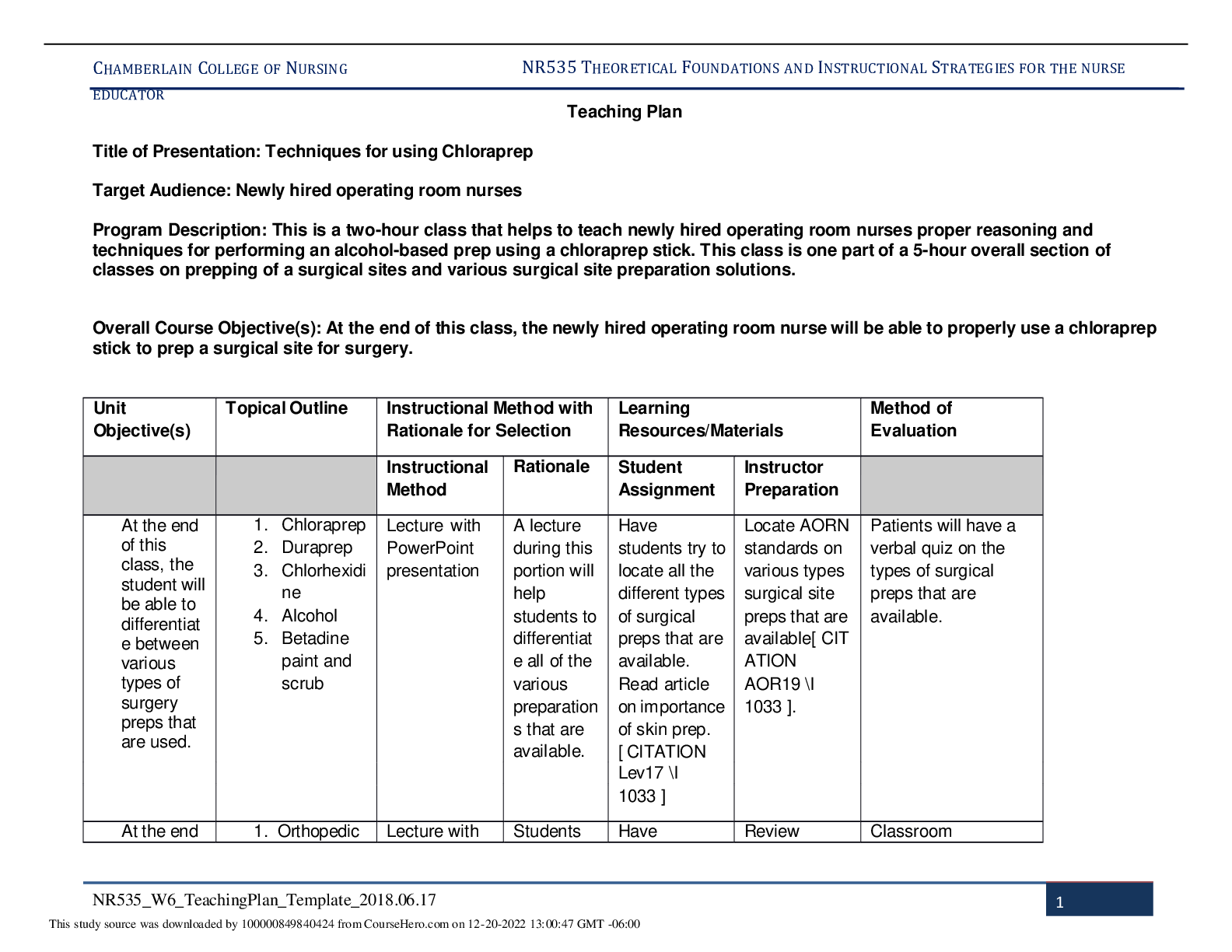

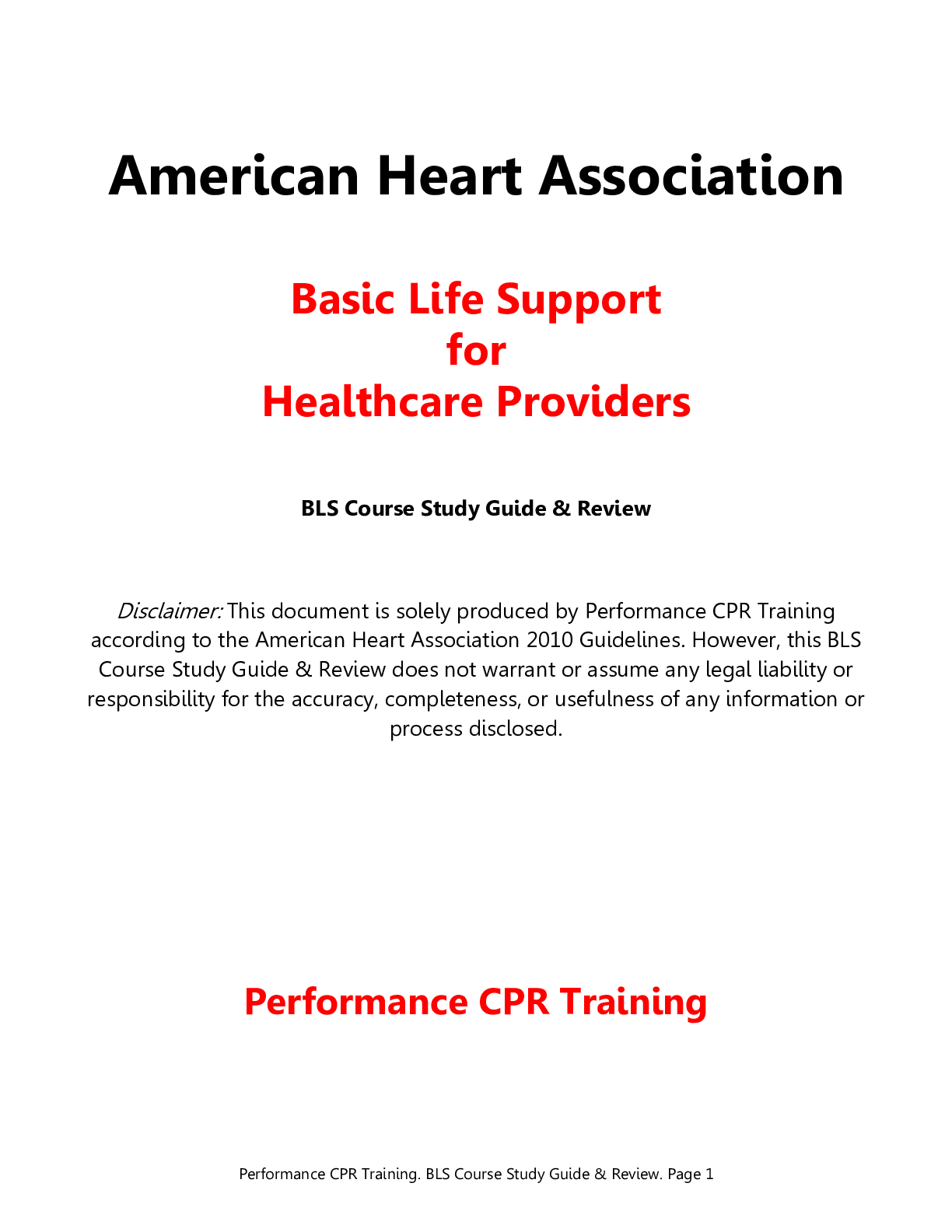
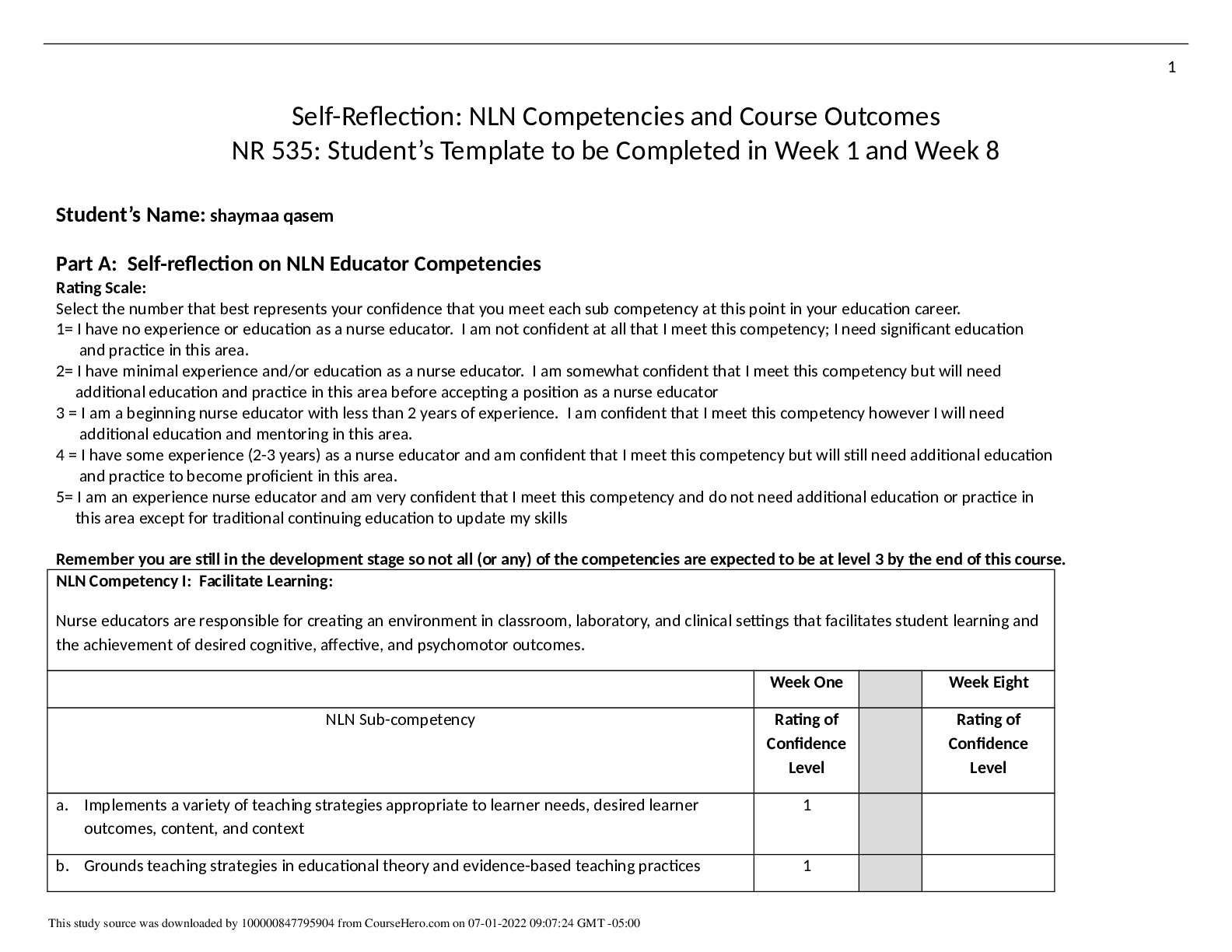

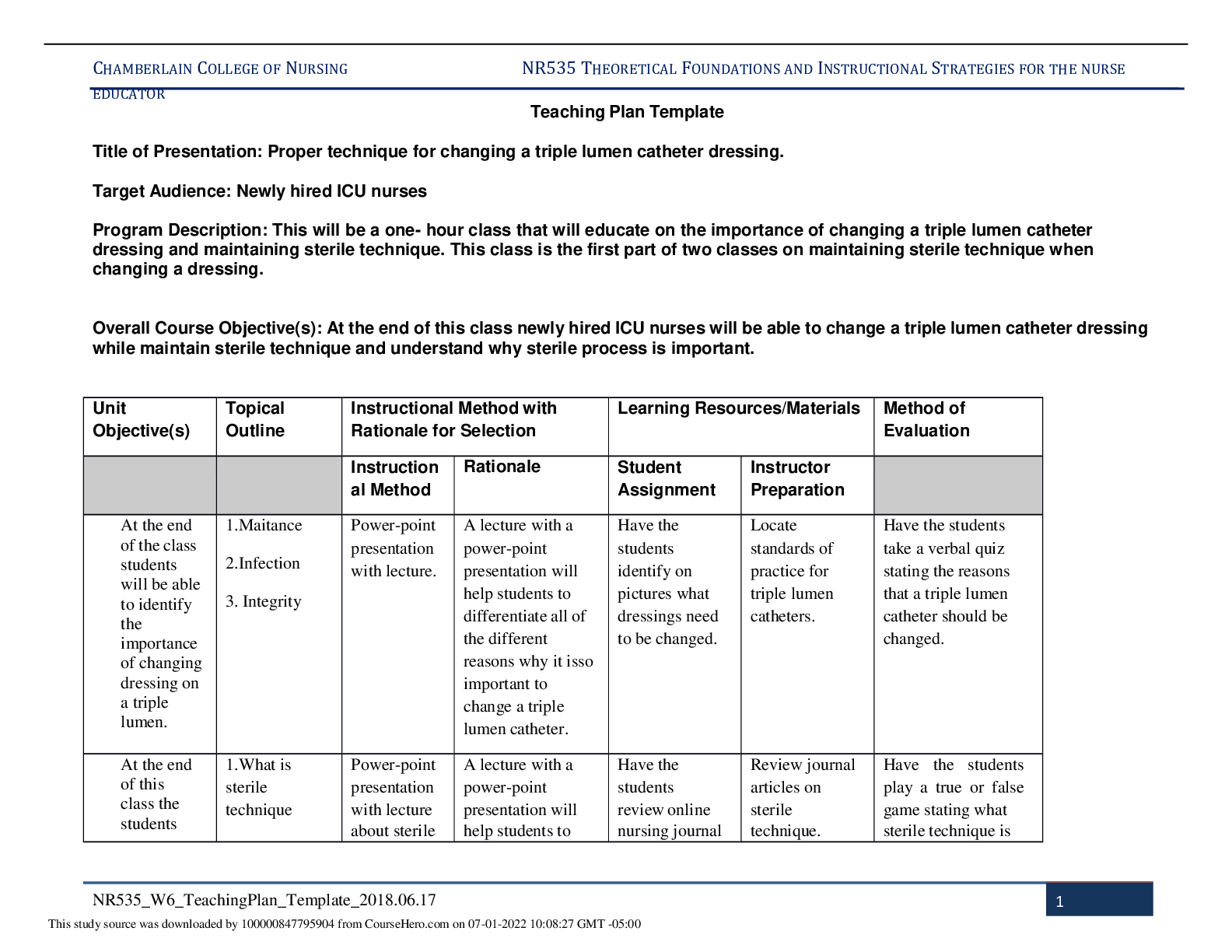
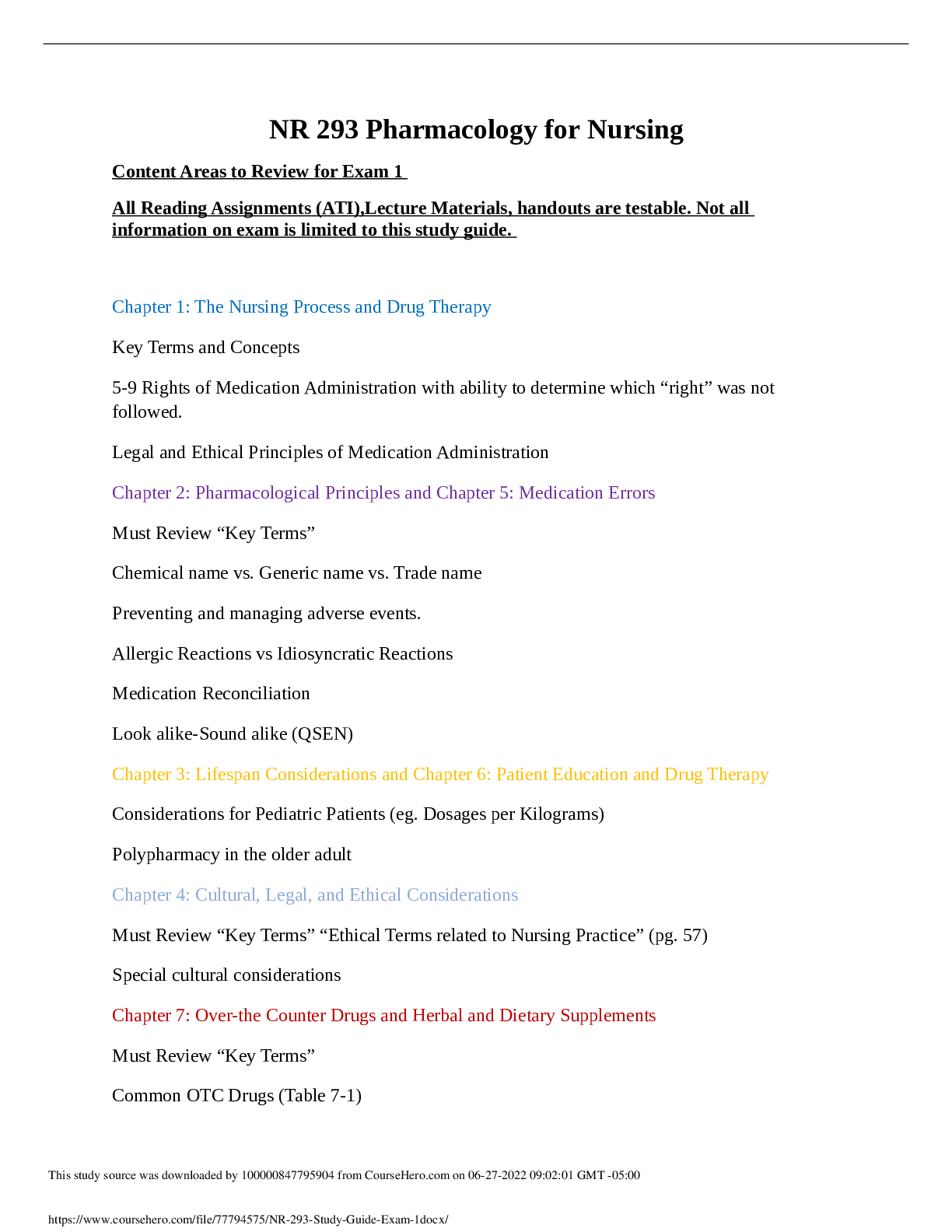


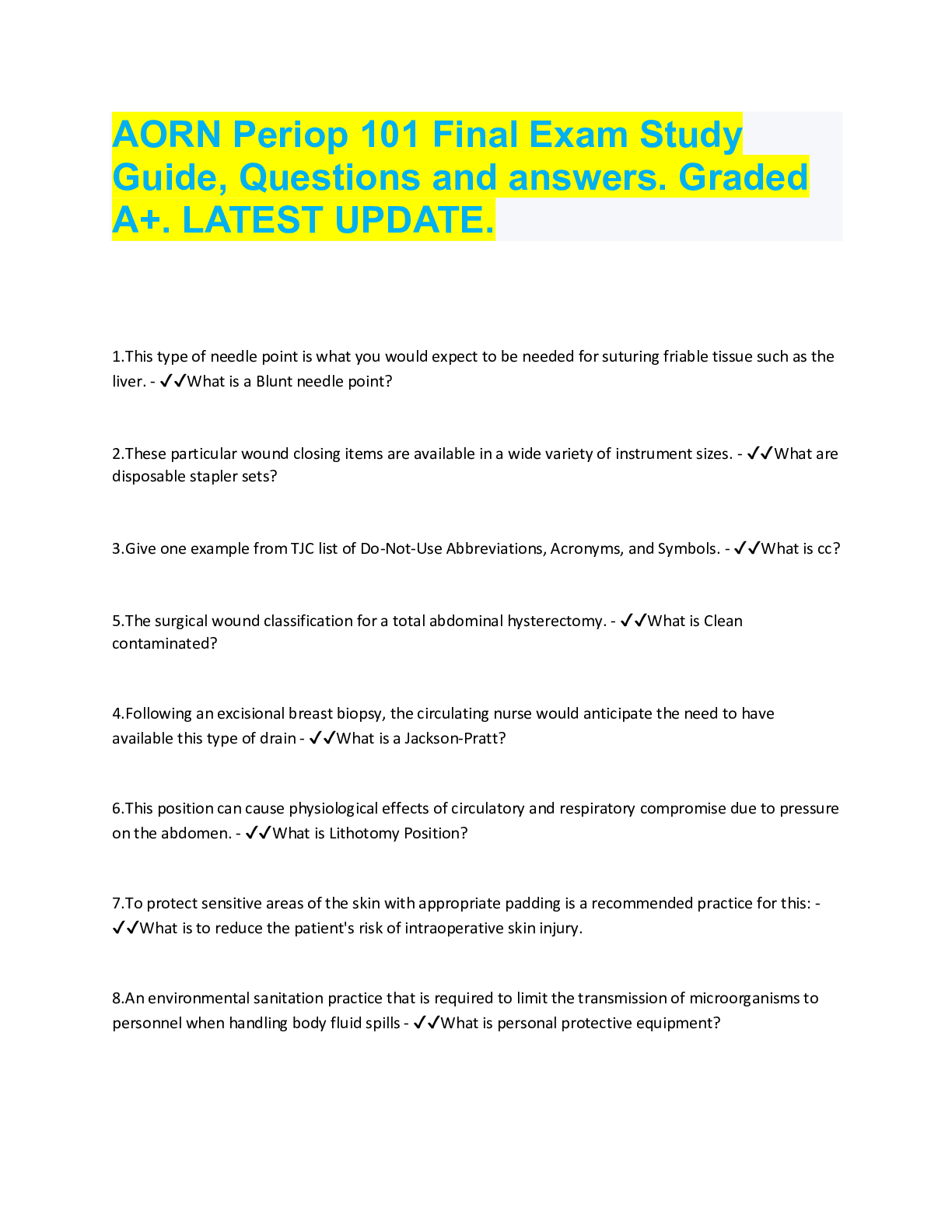
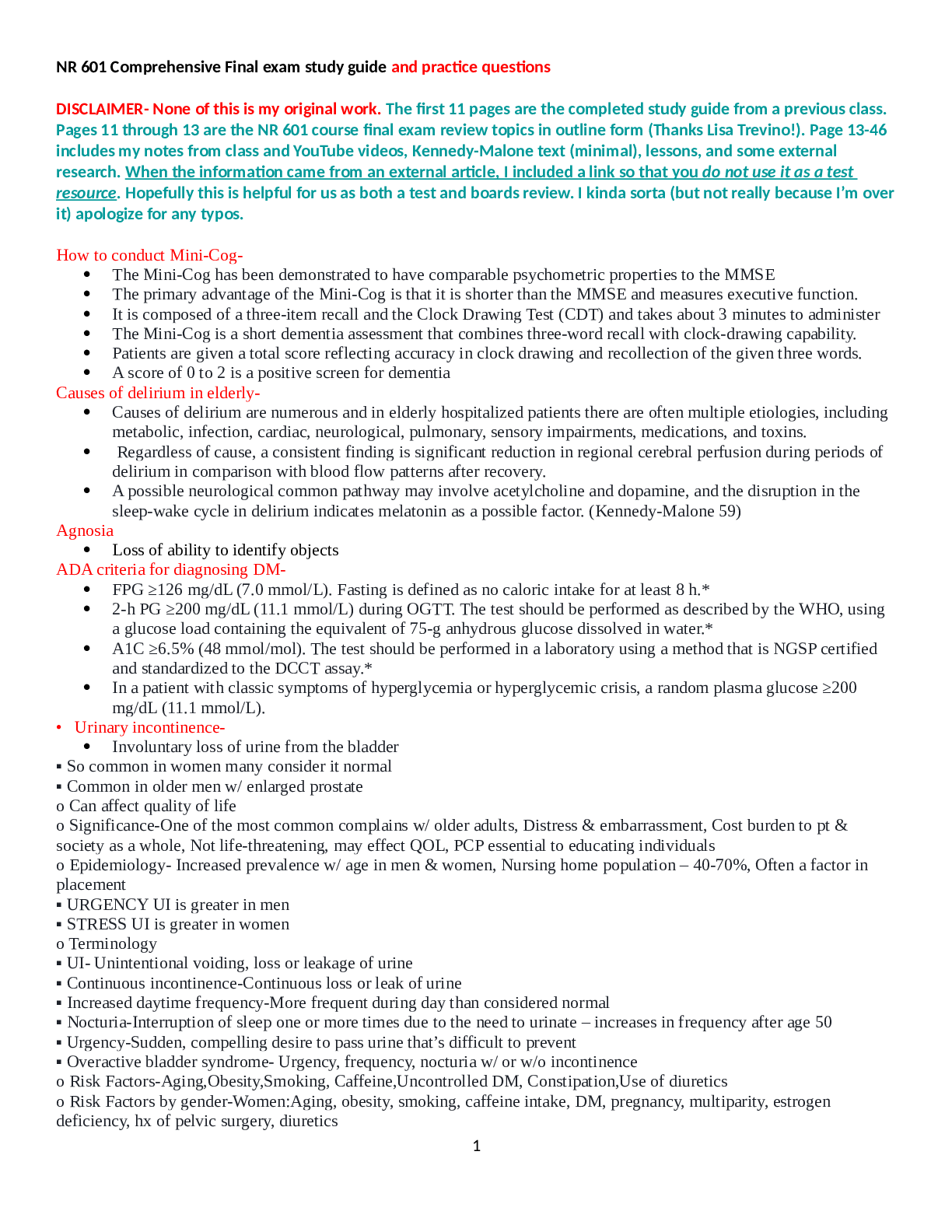



.png)

